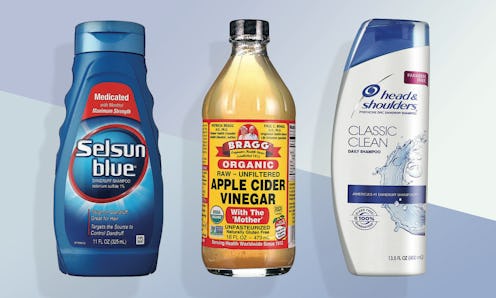
If you’re dealing with a flaky and/or itchy scalp, you've probably got dandruff, a common skin condition that's caused by low-grade inflammation. Treating it can be tricky, though — so, to find out how to get rid of dandruff, I spoke with board-certified dermatologist, Dr. Candace Spann.
Dr. Spann explains that there are a variety of over-the-counter products available to help you get rid of dandruff and prevent it from returning. But first, a little bit of background on the (many) reasons someone might experience dandruff. “Many people start to show signs of dandruff around puberty as the scalp and hair become more oily. Heavy, occlusive oils and pomades in the scalp can make dandruff worse for people who have a tendency to develop dandruff, and overgrowth of yeast has recently been shown to be a major contributing factor.” Finally, she adds, “Diets high in sugar seem to contribute to dandruff. Remember: sugars feed yeast.”
The good news is that most people can treat their dandruff with over-the-counter medicated shampoos containing one of the following ingredients: zinc pyrithione, tar, ketoconazole, selenium sulfide, or salicylic acid. Try one of the shampoos listed ahead, suggested by Dr. Spann. Over time, if it doesn’t maintain its effectiveness, swap it out for a shampoo that contains a different ingredient. Frequent use may be required initially, Dr. Spann says, then most people find they can use their dandruff shampoo once or twice per week for maintenance.
Below are seven doctor-recommended shampoos, hair treatments, and natural remedies to treat and prevent dandruff on your own. If they don’t work, talk to your dermatologist about prescription products, which might be a better option for you.
We only recommend products we love and that we think you will, too. We may receive a portion of sales from products purchased from this article, which was written by our Commerce team.
1Use A Shampoo That Contains Zinc Pyrithione
The best-selling Head & Shoulders Classic Clean Daily Shampoo contains the antibacterial ingredient, pyrithione zinc, and is gentle enough to be used daily. For anti-dandruff shampoos to work most effectively, the secret is to let them sit for about 10 minutes before rinsing, Dr. Spann says (though you should always read the label first, since some shampoos shouldn't be kept on the scalp for extended periods of time). This shampoo is sold in a pack of two, and with each bottle containing over 13 ounces each, you should be set for ages.
2Try A Shampoo With Ketoconazole
Another flake-fighting, itch-relieving shampoo to consider, Nizoral A-D treats dandruff with the anti-fungal ingredient ketoconazole. The brand suggests using it twice a week between washes with your regular shampoo; Start out there and see what works best for you.
3Or Try A Shampoo With Tar
Tar doesn't sound like an appealing ingredient to use in your hair, but Dr. Spann says it's proven to be effective at treating dandruff. Just be aware that tar shampoo, like the highly rated Neutrogena T/Gel, poses the risk of discoloring lighter hair and making scalps more photosensitive, says the American Academy of Dermatology. So if you do wind up trying this shampoo, wear a hat whenever you're in the sun.
T/Gel is also a popular choice among people with psoriasis and eczema. One Amazon reviewer commented, "Like many of the other 5-star reviews here, after two uses and less than a week my psoriasis covered scalp has almost completely disappeared. The red sores are almost gone, and I have no flakes or dandruff anymore."
4If Those Don't Work, Selenium Sulfide Might Be The Ingredient For You
This Selsun Blue dandruff shampoo contains the anti-fungal ingredient selenium sulfide, as well as cooling menthol. The Mayo Clinic says it's important to rinse well after shampooing with selenium sulfide, otherwise it can discolor your hair and scalp. Selsun Blue suggests leaving their shampoo on your head for about two minutes to really let it work.
5Give Your Scalp A Deep Clean With An Exfoliating Shampoo
“There are lots of newer treatments on the market," says Dr. Spann. "Charcoal cleansers and hair masks have been getting a lot of attention lately because they claim to cleanse and detoxify the scalp." For example: The Briogeo Scalp Revival Charcoal and Coconut Oil Micro-Exfoliating Shampoo, which aims to treat, flaky, itchy, or otherwise irritated scalps using a gentle, 98% naturally derived formula. In addition to Binchotan charcoal and coconut oil, the shampoo contains other good-for-hair ingredients like biotin and tea tree oil. Use it a couple of times a week to treat your scalp to a deep, soothing clean (it also helps eliminate product buildup, which could be another cause behind your dandruff).
6Rinse Your Hair With Apple Cider Vinegar
Natural ingredients that may be able to treat dandruff include tea tree oil, apple cider vinegar, charcoal, and coconut oil, which "Have all be shown to be helpful in small studies and in anecdotal reports," says Dr. Spann.
To combat dandruff and remove product buildup from your hair, trying doing an apple cider vinegar rinse with the cult-favorite Bragg Apple Cider Vinegar. Add a few tablespoons of the vinegar to warm water, then massage it into your hair before rinsing out. Use a product like this to make the process easier!
7Apply A Hair Mask With Tea Tree Oil
Tea tree oil is an anti-fungal and anti-bacterial ingredient that has many skin and hair benefits, and, as Dr. Spann mentions, it may be able to help treat dandruff. Even if it's not a targeted dandruff-fighter like the medicated shampoos on this list, this Lavender Mint Tea Tree Hair Mask is still worth incorporating into your weekly hair regimen, since it works to restore moisture to the hair and scalp, and dryness and dandruff often go hand-in-hand.
Expert:
Dr. Candace Spann, board-certified dermatologist, co-owner of Couture Dermatology & Plastic Surgery in Las Vegas, and founder of ReTress, a product line for women's hair loss.